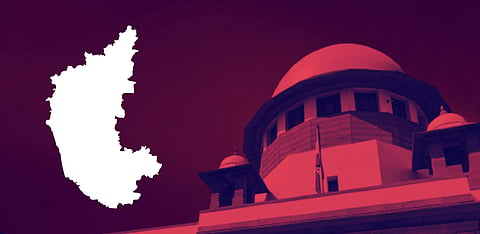

The Bench comprising Justices K.M. Joseph and B.V. Nagarathna directed that the previous notification that allowed the reservation for Muslims continue till the next hearing.
—
ON Tuesday, the Supreme Court granted a further adjournment till May 9 to hear the plea that challenged and prayed for a stay on the contentious government order (GO) in Karnataka that scrapped 4 percent reservation quota for Muslims as part of the Other Backward Classes (OBC) category in education and public employment in the state. In particular, the court directed that the earlier notification dated March 30, 2002, that allowed such reservation, will continue to operate till the next hearing date.
On April 18, the division Bench comprising Justices K.M. Joseph and B.V. Nagarathna had granted more time to the state of Karnataka to file a reply to the petition on Solicitor General of India Tushar Mehta's statement of assurance that the state government will not take any steps in terms of appointments and admissions in pursuance of the GO.
Today, Mehta, appearing for the state of Karnataka, requested the Bench for a further adjournment of a week on account of the ongoing Constitution Bench hearing (on same-sex marriage) and submitted that his statement of assurance given on the previous date will continue to operate. He further submitted that the reply to the plea has been prepared and is ready to be filed. Senior advocate Mukul Rohatgi, appearing for the Vokkaliga and the Lingayat communities, sought adjournment till May 9.
Advocates appearing for the petitioners vehemently opposed the adjournment on the ground that Mehta's statement of assurance that no appointment will be made as per the GO is not enough to benefit the petitioners. "Our quota has been scrapped and brought to zero. We can't make an application belonging to II (B) until the impugned order is stayed," they contended. The advocates for the petitioners prayed that the adjournment be granted on the condition that the previous notification of March 30, 2002, which grants 4 percent reservation to the Muslim community, continues till further orders.
Consequently, Mehta stated that the assurance that the GO will not be implemented, in turn, implies that the previous notification will continue to operate.
On hearing the parties, the Bench adjourned the matter to May 9 and passed two directions— firstly, that the orders by the Karnataka government, dated March 27, will not be implemented until the next date of the hearing; and secondly, that the earlier notification, dated March 30, 2002, will continue to "hold the field" till such next hearing date.
On April 13, the Bench heard the plea to stay the GO, which reclassified the OBC category by scrapping the 4 percent reservation quota for Muslims under OBC category II(B) and moving them to the Economically Weaker Sections quota. Additionally, the Vokkaligas and the Lingayats (both demographically, politically and economically dominant social groups within the state), previously included under categories III(A) and III(B), were granted an additional 2 percent each of the freed-up reserved seats, increasing their share in the OBC reservation pool.
The announcement of the GO was made a day after a division Bench of the Karnataka High Court had vacated a January stay on the state government's order creating two new OBC sub-categories for the Lingayats and the Vokkaligas. The high court lifted the stay after Mehta assured the court that the new OBC sub-quotas would not affect the existing 15 percent quota for other OBCs.
Earlier, on the behalf of the petitioners, senior advocates Dushyant Dave, Gopal Sankaranarayanan and Prof. Ravivarma Kumar, argued that the GO was passed summarily, without any enquiry, empirical data or report to support it. The petitioners also alleged that the GO falsely states that at the time the II(B) category was created and Muslims were classified as backward classes, there was neither any recommendation by any authority nor was there empirical data for granting them reservation.
It was also highlighted by the petitioners that with the approaching academic year, applications are required to be made for admission to all educational institutions for entrance exams. The GO deprives the Muslim community in Karnataka of availing the benefit of reservation, it was argued.
On the other hand, Mehta, for the state government, had claimed that the petitioners had failed to prove the need for an immediate stay and questioned the urgency of the stay, seeking time to file a reply to the plea.
Senior advocate Mukul Rohatgi, appearing for the Vokkaliga and the Lingayat communities, had argued that the present case pertains to not only the cancellation of the quota for Muslims but also the grant of the quota to other communities, and urged for time to file a reply.